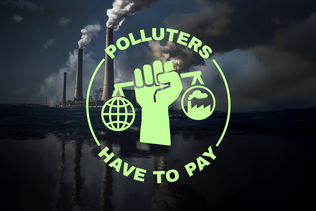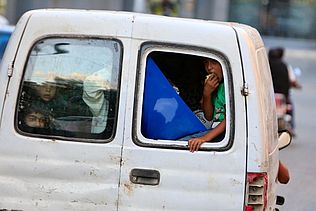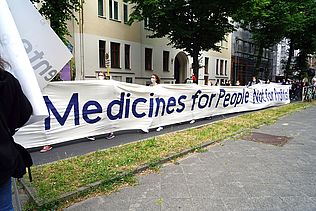New communication flows to create a network of global actions
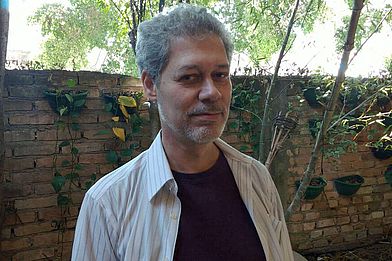
In early May 2022, a new calculation by the World Health Organization revealed: the covid pandemic may have caused, not the already unacceptable 5.4 million deaths over the past two years, but three times that number: 14.9 million. The new calculation corrects for underreporting - mainly in the countries of the Global South - and calculates indirect deaths, caused when patients could not access collapsing health systems. The data is shocking, particularly because Covid is a manageable disease, for which science has answers - isolation, vaccines and now drugs. The causes of deaths are therefore due to inequality and lack of adequate policies. But while it is important to denounce the causes, it is critical to seek alternatives. They are the ones that open paths to a transformed Health and Society. Here are three of them:
Replace patents with a new system of incentives for scientific research: Never before in the history of science has it been possible to produce effective vaccines so quickly against a virus that causes a pandemic. The reasons for this are clear. Scientific research was conducted with ample public funding. However, the vaccines produced did not reach the majority of populations because the pharmaceutical corporations that benefited from government subsidies appropriated the results. These corporations have long neglected research into molecules capable of tackling the diseases of the majority in order to focus on drugs that bring them the most profits. It is time to change the logic that drives scientific drug research. It should not be guided by the quest for maximum profit, but by the public's Right to Health. The patent system is not an adequate stimulus to the development of new drugs. It can be replaced, with great advantages, by a system that combines public funding, abolition of the patent system, free access to knowledge, and setting of research priorities by committees in which scientists, health authorities and social movements are represented.
Treat Health as a Global Commons: Globalization has dismantled borders, reduced the power of national states, and created a new sphere of power. But this new sphere is not democratic, it is dominated by large corporations. The multiplication of international flows of goods and people increases the risks of spreading viruses, but who allocates resources to protect the health of populations? Global problems have emerged - climate change, financial crises, pandemics - that many states do not have the resources to address. We need to create a global democracy that allocates resources where they are needed - especially to address health crises. AIDS could have been brought under control worldwide long ago, but the necessary medicines have come too late and have not yet reached all populations that need them. A global democracy requires democratic supranational institutions that define the common goals of humanity. It also requires an international tax system - on financial flows, CO2 emissions, mineral and fossil fuel extraction, air travel, etc. - that generates the resources needed to achieve these goals.
Establishing new communication flows for another possible world: Numerous social movements that fought against the Covid-pandemic. Networks like medico international bring many of them together. But the communication needed to turn them into an articulated movement is still weak. It would be a big step forward if the experience of the fight against the pandemic could produce a network of global action for the right to health; for public systems that ensure this right; and for a global distribution of wealth that establishes that right worldwide.
Antonio Martins, Brazil
A TRIPS waiver in its original form

Pre-covid inequalities in access to social determinants of health (SDH), which deepened during the pandemic, increased the vulnerability of people and health systems to the pandemic. Covid-19 exposed the importance of good quality public health systems in providing universal access to care based on need, not ability to pay. Failing to treat or prevent a highly infectious disease in uninsured persons meant that those with access to health care were also at risk – so the exclusion of poor people from care was neither morally justified nor in the interests of those who had health care.
But we also know that Covid-19 adversely impacted access to primary care services in the public sector for non-Covid 19 conditions and it was poorer, more marginalised communities who suffered the brunt of such downscaling, whereas those with access to private health care were not as affected. The pandemic illustrated that we need to reinvest in public health systems and reverse the privatisation and commercialization of health care. In many (not all) places the public sector offered care to most people, despite serious financial, infrastructure and staff constraints. Community health workers were at the frontline of this effort, but disappointingly this has not been recognized through improved working conditions and salaries.
Activists must continue advocating for the TRIPS waiver in its original form, which argues for suspension of IPR on Covid-19 diagnostics, therapeutics, and vaccines. Vaccines remain largely unavailable in Africa, even as they expire in the global north or populations are receiving booster doses. Technology transfer and a temporary suspension of all IPR on Covid-19 technologies remain crucial to building long-term capacities for regional manufacturing of Covid-19 vaccines. Without this, the global south remains dependent on charitable donations or failed mechanisms like COVAX. The waiver will also promote access to Covid-19 tests and treatments, some of which are patented. This helps to limit transmission. Additionally, universal access to testing improves public health authorities’ information about new variants, enabling better Covid-19 prevention and management nationally and globally.
Finally, we must advocate for greater transparency around the R&D costs of new technologies and the public funding subsidising pharmaceutical corporations. We must persuade public institutions to take ownership of the intellectual property generated through public investment, so that the health products emerging from these investments are truly public goods. This is entirely consistent with the human right to benefit from scientific progress contained in the International Covenant on Economic, Social and Cultural Rights, which has been ratified by 169 countries globally, including South Africa. Greater transparency is needed surrounding the procurement arrangements pharmaceutical companies make with governments and multilateral agencies. This will expose profits generated in excess of R&D, production and marketing costs, and prioritization of some markets over others. All of this information is vital to prevent pandemic profiteering and to promote treatment equity, and greater accountability from national governments.
Lauren Paremoer, South Africa
A recognition that our futures are interdependent
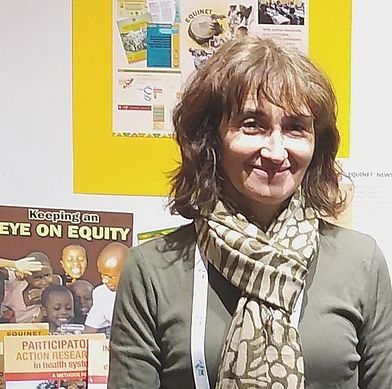
Talking about the pandemic means talking about the serious inequalities that were revealed, exacerbated and reinforced in it. Those who were better off were more protected and many large transnationals and wealthy people globally increased their wealth significantly during the pandemic, while many people got poorer. However those living or working in precarious conditions become even poorer and more insecure, were less able to implement public health measures, deeply affected by lockdowns and had less access to social assistance. There has been justified attention on inequalities in access to vaccines, but the inequalities have deepened far beyond that. I am referring to inequalities in access to clean water, to food, to income, to education and health systems, and in access to many forms of social protection. In all these areas, major investments are needed, including in the public sector health systems that most people use and for the three P’s - prevent, prepare and protect- that countries are addressing in relation to pandemics. Added to this the response has involved some top down, authoritarian approaches that do not enable the social involvement and participation needed for equity.
We also need to talk about those economies and ecologies that make pandemics increasingly likely. For example, the expansion of monocultures in agriculture and the extractive industries mean that more and more communities have to live close to wildlife and animals are also in mass farming that encourages spread of new viruses. Not only for pandemics, but for addressing inequalities and the existential crisis of climate change we urgently need to bring social, economic and ecological concerns into a new balance. Business as usual is not an option. The current pandemic has also shown that ignoring local, social knowledge and depleting biodiversity is a risky course of action. Current production and global rule systems also create barriers to the distributed local production of health technologies that is essential to ensure access for all. We saw the need for local production in the protectionism and disruption to supply chains during the pandemic. In the conflicts over who is allowed to produce vaccines and to whom they are available, corporate and high income country interests have prevailed. You could also put it this way: our technologies are much further along than our achievements in implementing values of global public good and solidarity.
Wealthy states and societies must recognise that our futures are interconnected and interdependent. We will not succeed in securing a small part of the world and abandoning other parts to growing insecurity. East and Southern Africa, with its rich resources and biodiversity, must use these resources for the wellbeing of its own populations, and not just for those in other parts of the world. It is not only in relation to vaccines that we need local production. We need to move away from models of development based on high levels of resource depletion for extraction and export to sustainably use and enable benefit from our resources. The pandemic has been a wake-up call for this in relation to vaccines, food supplies and other needs. If we continue without wider changes, in the region and globally, we will experience escalating inequality, pandemic, conflict, and ecological threats that in the end will be an existential threat for us all.
Dr Rene Loewenson, Zimbabwe
Covid-19 is the virus, global power relations are the disease

The virus was able to unleash its force only because it encountered global power relations that turned a pandemic into a polypandemic. It has thus triggered economic insolvencies, increased food insecurity in conjunction with the climate catastrophe and exacerbated existing famines. Since the vaccines have been developed, the dominant powers have made it clear to the rest of the world that they are prepared to defend the capitalist logic of globalisation at any cost. They accept the prolongation of the pandemic with millions of deaths instead of finally following the internationally raised demand for the transfer of knowledge and the suspension of patents and enabling a fair distribution of vaccines. With the millions of vaccine doses that end up in the garbage in the industrialised nations because the expiration date has been reached, the rich countries are disposing of the right to health – and with it their credibility.
The message of the industrialised nations to the people in the Global South is: your lives don't count. They are perpetuating a state of the world that has abandoned the political project of a good life for all and is focusing on securing wealth and privilege. To question this principle is to raise the question of the system. A politics that combines human rights, dignity and freedom has no reliable allies either in the ruling politics or in the market. It must help itself to return to where it belongs: with the people.
By fatally exposing the unequal distribution of power and resources, the Covid 19 pandemic has underscored the need to decolonise the global health architecture. This goes far beyond the vaccine debate. It is about the asymmetric nature of global health and necessitates a reorientation of knowledge production. A globally conceived health policy can only work if it is based on human rights principles and understands patents as a global commons. This also applies to new instruments of prevention such as the Pandemic Treaty, which is currently being negotiated at the WHO. This is worth the effort if it contains clear criteria for the design of international law. Stricter laws and regulations are needed so that states and corporations can live up to their respective human rights obligations and responsibilities.
Anne Jung, Germany

